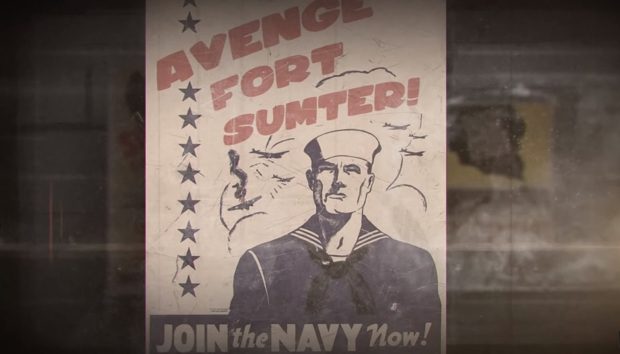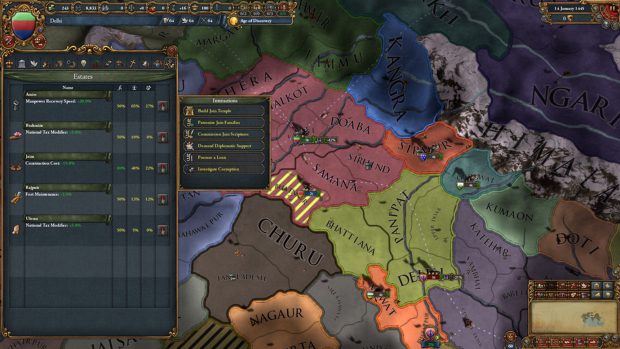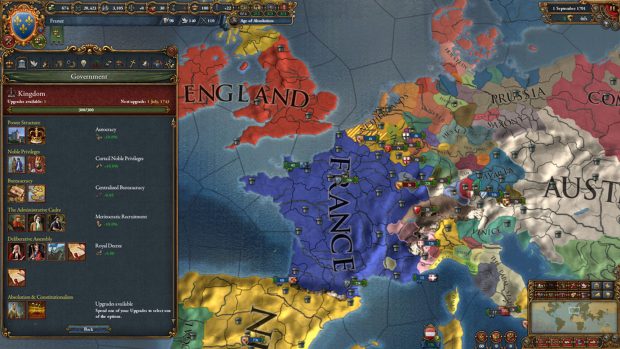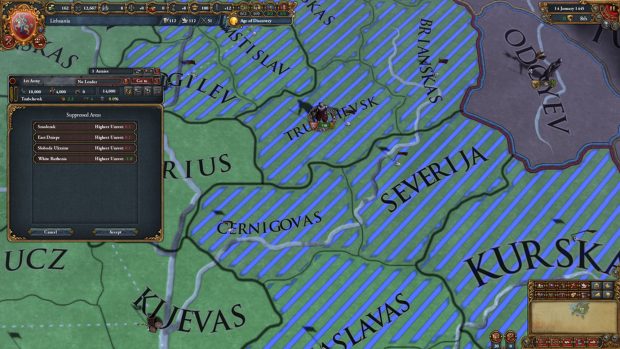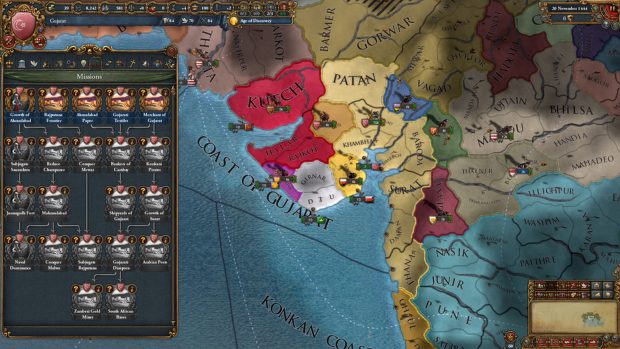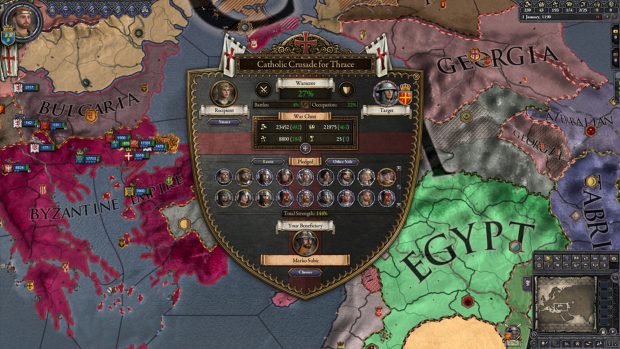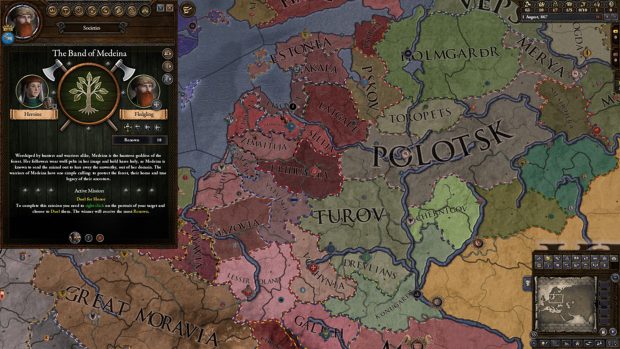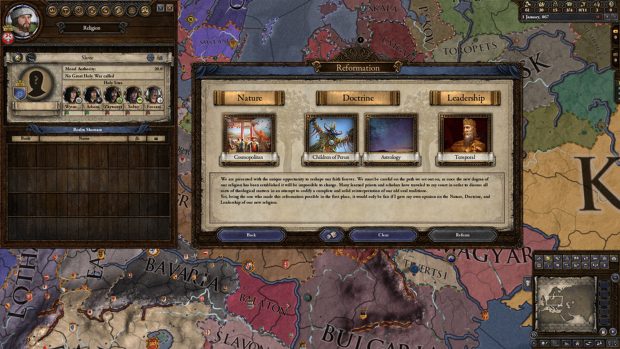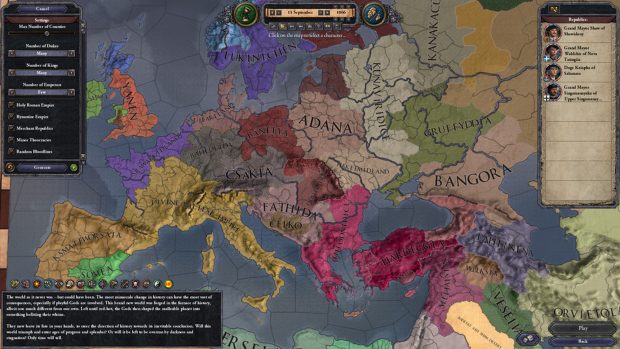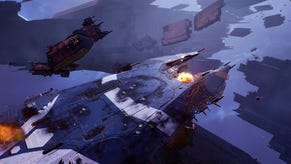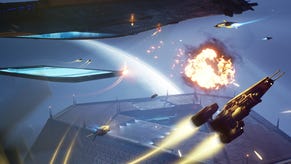What's next for Crusader Kings 2, EUIV and Hearts of Iron IV DLC
From reformed pagans to unreformed sharks
The Paradox DLC factory continues to diligently extend the lives of its myriad grand strategy romps, with all but Stellaris getting new DLC announcements at PDXCON last month. We’re getting restless pagan warriors, war elephants and even some sharks. If you can match the feature to the game, you get a polite nod of respect.
Rather than tiring you out, making you click on three articles like a thoughtless task master, I’ve gathered all the sizzling deets in one place. Rest those fingers and direct your eyes below to find out what’s changing in Hearts of Iron 4, Europa Universalis 4 and Crusader Kings 2.
Hearts of Iron IV: Man the Guns
Out of all the upcoming Paradox expansions, Hearts of Iron 4’s naval DLC, Man the Guns, has the most of that all important quality which drives grand strategy games: sex appeal. War is terrible, but as Man the Guns reminds us, it also contains buff, shirtless dudes.
Being the dominant naval powers, the UK and US are in the spotlight, particularly the latter, which gets some unusual alt-history paths as a result. Both countries get a clearer route to communism, if they want to jump ship, while the US can have a second civil war, with the South rising up and taking over.
Other nations can encourage the civil war and support one of the sides in the hope that they’ll join their faction. It’s also handy if you want to keep the superpower occupied. “If you can’t keep America out, keeping them divided is pretty good as well,” points out game director Dan Lind. Sounds familiar.
Naval warfare is an aspect of Hearts of Iron that a lot of countries don’t really get involved in, but Lind is hoping to make it a bit more attractive, giving more reasons for even smaller countries to invest in their navies, as well as creating more ways for them to be effective.
A new ship designing system means that you’ll be able to research and upgrade components and slot them onto new ships. Rather than overwhelming with numbers, the point is to create a specialised force tailored to your specific needs, putting them into the smaller, more focused task forces that will replace giant fleets. And instead of shelling out for new ships, you’ll be able to refit older ones, even turning battleships into carriers if you fancy.
“That means we can also make stuff a bit more competitive, at different tech levels,” says Lind. “Meaning that Britain has to care about upgrading stuff despite having a massive navy.” All those intimidating vessels need to be put out of commission temporarily while they’re being upgraded. Even if a country is ahead in the tech race, if they’ve got a lot of ships, it might take a significant amount of time before they can take advantage of the improvements.
Naval terrain can also be an equaliser, creating obstacles and advantages depending on what part of the ocean you’re sailing through. Fighting in the huge expanse of the Atlantic, for instance, is different from hunting down ships around an archipelago. For rough weather, you might want larger, hardier fleets, but a bunch of small vessels can do great work while hiding around islands.
“I want to give the home advantage to nations,” says Lind. “To be frank, America and the UK have huge fleets, and nobody else really does. Any advantage we can give to anyone else is going to make the game more interesting. They have to be everywhere, whereas if I’m Sweden, I can really tailor my fleet for home defence.”
The most serious threat in the water isn’t the ships or the weather, however; it’s a lot more terrifying. “In the Pacific, there’s going to be sharks. Honestly, it won’t have a big strategic impact, but it’s super cool, and you’re going to have bigger manpower casualties.”
Sharks! What are they doing, getting involved in human wars? It’s only OK if we can ride them, which Lind assures me we cannot. A task for the modders, then.
The sea is a mysterious place. We know more about obscure Star Wars characters that feature in one panel of one comic 30 years ago than we know about the sea. Where did it come from? Why is it wet? What’s with that weird smell? Paradox wants to capture that enigmatic quality by making it hard to see stuff.
“One of the big problems with the current system is spotting,” says Lind. “You roll a dice, eventually everyone finds each other. That’s why submarines always get caught, because they don’t have a way to hide or run away.” That should become a thing of the past, with fleets needing to actively hunt, getting hints about how close they’re getting. Even if an enemy is spotted, they can still escape and go back into hiding if they manage to destroy the spotter before the main fleet can arrive.
You can’t do any of this without fuel. It’s the resource that powers the war machine, from ships to tanks. Everyone will need it, and there will never really be enough, even if you’re building places to stockpile it. Lind wants to use fuel to stop players from fielding their entire navy all the time, and it’s given him an opportunity to beef up some of the units. Tanks, for example, will be considerably more dangerous, but players won’t be able to use as many of them.
“This will be a huge balance change because it’s going to impact almost everything. I think that the game will play quite differently.”
Europa Universalis IV: Dharma
With Dharma, Europa Universalis 4 is giving India lots of attention, but it also promises to be a far-reaching expansion, affecting every country outside the subcontinent. It digs through both the core game and its DLCs, significantly overhauling elements from both. “Despite EU4 being on the go for five years now, we’re still not afraid to completely redo old systems,” says game director Jake Leiper-Ritchie.
Also, there are war elephants! Lamentably only in India. I did wonder if we might be able to ship them over to Scotland, but it sounds like that’s one dream I’ll have to see go unrealised. The elephants are also just a bit of flavour, replacing the cavalry model but not changing the statistics.
India is going to look a bit different in Dharma, with new starting situations and changes to various provinces. Delhi, for instance, was dealing with a revolt originally, but the developers didn’t think it was a fun start, so with Dharma it begins with this small heartland and better years behind it, but it’s surrounded by cores and has a couple of subjects to manage. It offers more choices, says Leiper-Ritchie.
Following on from Rule Britannia, India will get a group mission pool, while the bigger powers in the area will receive unique mission trees. Other nations will also have more reasons to head in India’s direction, as the new charter company system will let prospective colonial powers buy land in both Africa and Asia, gaining a foothold through diplomacy and bribery.
“Buying provinces has been requested and discussed before,” says Leiper-Ritchie, “but we had to put it in such a way that you can’t just throw money at people to win the game.” That means there will be a cap on what they’re willing to give you, regardless of how much money you’re willing to burn. Their opinion of you will obviously matter as well, and if they’re an empire, they simply won’t sell to you at all. Rude! But also probably very smart.
Whether you’re going to be messing around in Goa or squabbling over Europe, you’ll be able to decide how your government works. Every country is either a monarchy, republic, tribe or theocracy, but the flavour of that government is up to you. Government reforms will let you customise your government by spending points -- accumulated at a monthly rate that depends on your autonomy level -- on traits that reflect the kind of country you want to build.
As you work your way down the tree, you’ll be able to transform your government, eventually getting the choice to make an even more dramatic change, switching to a new form of government, like a monarchy becoming a republic. These traits aren’t all drawn from the same pool, either, with cultures getting their own unique reforms.
Policies, which let you further tailor your nation with a broad selection of bonuses, have been similarly reconsidered. “We found policies a bit inflexible. You’re kind of marrying the policy because you can’t change it for 10 years, and if somebody declares war when you’ve just taken some economic policies, you’ll be like, ‘Oh no, I know I should have taken the cannon ability or morale.’ So we felt like we could do better than this.”
The overhaul means that, instead of feeling like you need to focus on military policies or diplomatic policies, you never need to sacrifice one for the other. You’ll be able to pick three of each policy type, including administrative, for a total of nine. It makes more sense than having an entire nation focusing on war, but if conquest is on your mind, there are still just as many ways to be a big bully.
Several expansions ago, estates were added to Europa Universalis. These domestic factions or classes provide nations with bonuses, but they can eventually cause disasters or rebel when they become too influential. When they were introduced in Cossacks, estates were a premium system, but with the free update that comes with Dharma, estates will be free regardless of what expansion they own. To substitute this, Cossacks owners will get access to a special Cossack estate, as well as a new mechanic, the Cossack Breakaway, which lets you play as a Cossack nation with its own unique abilities.
Accompanying the transition to a free feature, estates are also getting some quality of life improvements, and Leiper-Ritchie promises that they’ll no longer pester and harass you for land. If you want to give them territory and increase their influence, you can do that, but there won’t be as much pressure. India also gets its own unique estates based on the caste system.
“These guys each have their own peculiarities, the lands that they want, the interactions you can have with them and the disasters they’ll bring to your country if they secure too much control,” says Leiper-Ritchie. “This is a change a lot of people really though we were never going to do, but we really wanted to tackle estates and this gave us the perfect opportunity to do so.”
If you do end up having a rebellion on your hands, the rebellion suppression system might come in pretty handy. With it, you’ll be able to paint the map for your rebel-hunting armies, dictating a specific route for them to take so they can avoid non-rebel forces and reduce unrest in the regions they march through.
The real treat hidden within Dharma, however, is the scornful insult. Essentially it’s just an especially mean insult, meant to make your enemies hate you more and their enemies like you. It’s a personal insult rather than a diplomatic one, and to reflect that, Paradox has put together a list of barbs, one of which will be randomly selected and sent to your nemesis. They’re tailored to the recipient, too, adding more of a sting. It’s extremely petty, which is also how I play Europa Universalis 4.
Dharma is due out later this year.
Crusader Kings 2: Holy Fury
Catholics and pagans, some of whom might be furious, are at the centre of Crusader Kings 2’s 800th expansion, Holy Fury. It also sees the return of crusades, which didn’t exactly go anywhere, but I really can’t remember the last time I paid attention to them. Well, aside from the time I played the Crusader Kings board game, where crusading is still very trendy.
“The old crusade system has been in the game for six years, since release,” says lead designer Alexander Oltner. “We thought it was high time to update it with something way more interesting and involved.”
With the old system, the Pope, Mr. Eager, jumps straight in and starts the crusade off before asking anyone to join him. It’s pretty irresponsible, and it means that you either have to get to the party late, or join unprepared. Usually, I tell him I’ll come and help him out but actually just keep doing my own thing until I forget there ever was a crusade. Nobody misses me.
Holy Fury gives it structure. There’s a preparation phase, where participants can pledge money, troops and beneficiaries who will remain in the crusader kingdoms. You can also choose to play as a beneficiary, switching characters and staying in the Holy Land. It’s not about gobbling up land anymore, either. You’ll be rewarded for participation at any level, not just because you conquered the most places.
The Pope isn’t just a guy who gets his friends to gang up on religions he doesn’t like, of course. He’s also lots of fun at parties, which is why you might want him to come to your coronation ceremony. Monarchs need to be coronated, unless they’re willing to upset basically everyone, and if you’re especially pious, you can get the Pope to do it. In a location of your choosing.
“You can get crowned in a barn, if you want, complete with the appropriate sounds effects,” says Oltner. “You can even invite the Pope when you have your ceremony in the barn. I highly recommend it.”
If you really want the Pope to like you, it helps to be descended from a Saint. The bloodline mechanic passes down traits through the generations, and if one of your ancestors gets posthumously transformed into a Saint, then not only will your bloodline get an accompanying trait, the Pope will be exceedingly impressed.
Pagans are more concerned with making a name for themselves rather than making friends with Popes. And they can do that at the warrior lodge, where everyone hangs out, getting into fights and boozing before they go off to seek glory and also get into more fights, presumably. It’s a new society with a focus on doing great deeds to gain some semblance of immortality.
“It’s focused on dueling, battles and camaraderie,” says Oltner. “To really strengthen these points in the game that were quite lacklustre before, we’ve completely remade every single battle event in the game, as well as the duel system, entirely.”
A character’s personal combat skill will help them in duels, though there’s an element of chance, and you can’t always predict what will happen in a battle. Skilled fighters will survive, though, and should be able to do impressive things. Skull trophies can also be collected, to be displayed prominently behind the warriors when they record YouTube rants.
To better compete with the Abrahamic religions, pagan religions can reform, giving their faith structure and picking up a lot of traits and mechanics from their non-pagan neighbours. The religion is created for you with the touch of a button, and you don’t get to make any decisions about it. It actually takes away some of the variety and flavour that you get with pagans. With Holy Fury, however, you’ll be able to build your own religion.
By picking its nature, two doctrines and a leadership trait, you can fine tune your religion to fit your big plans, or you can just make something a bit weird, like a Viking religion that embraces multiculturalism and pacifism. War, economics, whatever astrology is good for -- custom religions have their fingers in lots of pies, improving them with bonuses.
If you’ve had enough of paganism and want to join the feudal world, you can always request a mass conversion, getting help from a sponsor who gives you money and priests and generally just helps to make the conversion nice and painless. Instead of dealing with a revolt, your family and most of your vassals will join you, and your new Christian pal will continue to help you out, building churches or sending a priest to advise you.
Crusader Kings 2 has been knocking about for over seven years, and history has been around for a few years longer than that, so you might be ready for something new. The shattered and random world settings could scratch that itch.
The shattered world allows you to adjust a multitude of settings and then break everything up into its constituent parts, creating a world where everyone is a count or a duke. It’s essentially a more even playing field. The random world, on the other hand, “tries to simulate history as it could have been,” explains Oltner. Everything but the landmasses can be randomised, conjuring up not just new kingdoms and empires, but cultures, religions and dynasties.
This means infinite worlds in which you can murder your spouse and marry your horse.
Crusader Kings 2: Holy Fury is due out later this year.




